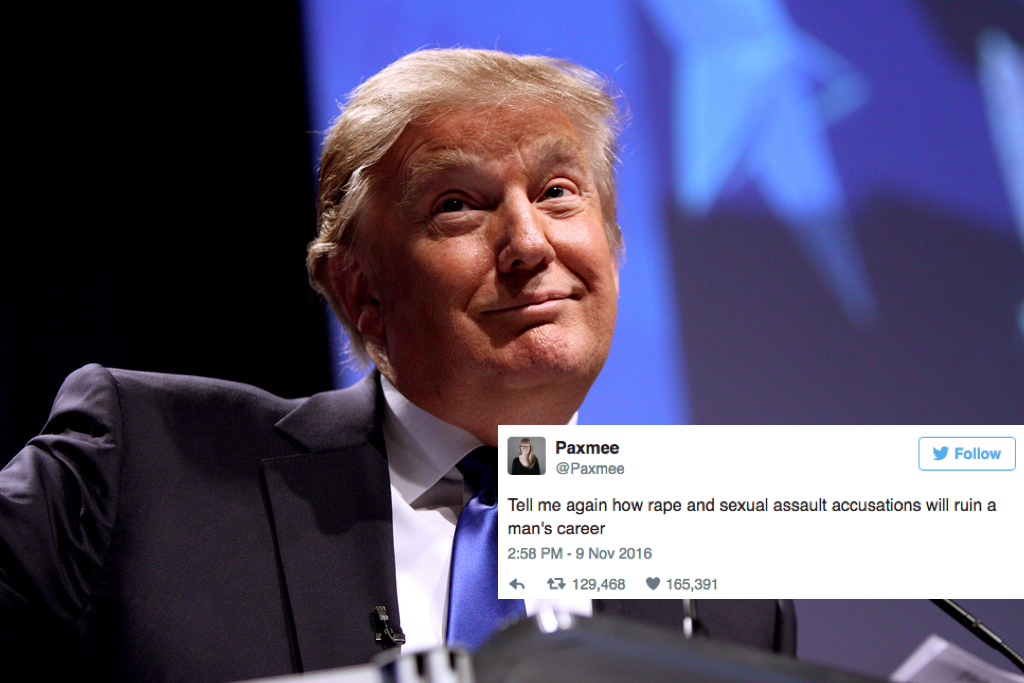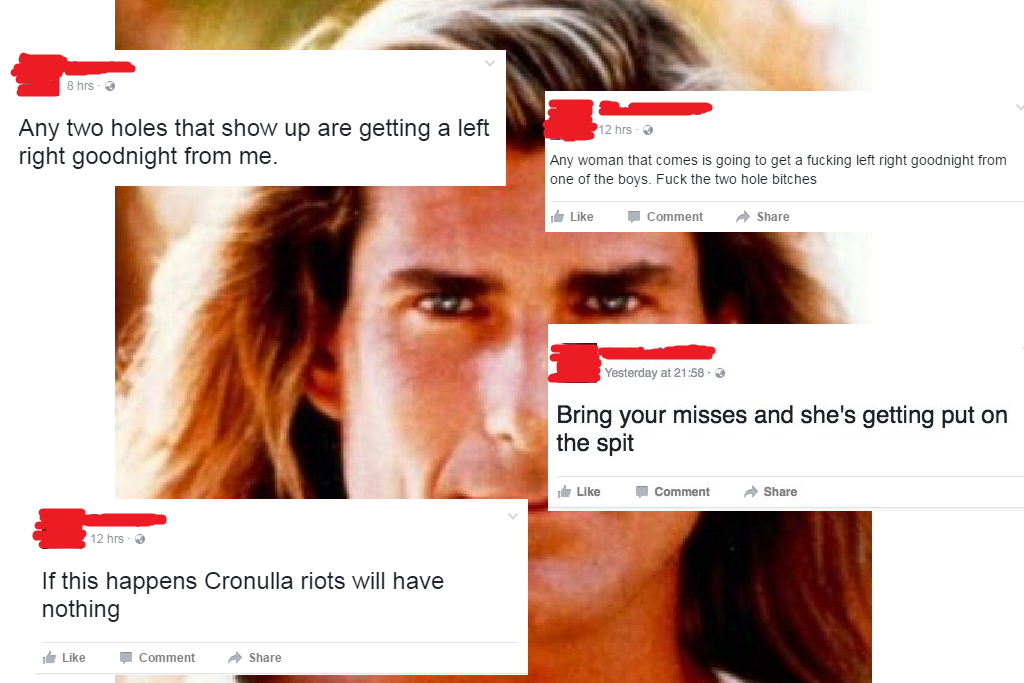How Do We Stop Vile Online Abuse When Facebook Won’t Do Anything About It?
A revolting post went viral this week after being called out from a men's-only group. Here's the story behind it.

Earlier this week a post on Facebook, shared by activist and author Clementine Ford, went viral. The post is a screenshot of a revolting Facebook thread, in a private men-only group, that ridicules a young woman who has been filmed during sex (with the man who originally posted the picture/comment).
The screenshot was publicly shared by Hayden Brien, a DJ from Newcastle, who wrote, “This crosses the line in a very very big way, and needs to be stopped immediately”.
Brien is right; the post is absolutely abhorrent in every conceivable way. Not only is it a massive violation of trust and respect — not to mention a vile sentiment (a “tubby phase”????) — it’s also now illegal in NSW, where strong new laws are being introduced to punish “revenge porn” i.e. the sharing of pornographic images of a sexual partner (usually a woman) without her consent.
Brien reported the original post to Facebook and, as he said, “THIS IS WHERE IT GETS INTERESTING” (although not at all surprising). He got a response from Facebook Community Standards claiming that the post did not violate their guidelines. But legalities aside, if Facebook won’t stop these people, what is there that’s left to do? How do we stem this vile culture of harassment, disrespect and malicious vulgarity online?
The History Of Facebook “Moderation”
This is far from the first time an issue surrounding Facebook’s moderation standards has been raised by the public. Clementine Ford, the writer who shared Brien’s post on Facebook yesterday, has been a long-time critic of the bogus community standards by which Facebook moderates its site.
Last year Ford reported a meme depicting an instance of domestic violence (which, by the way, should not be a thing) under Facebook’s category of “annoying or distasteful behaviour”. She was knocked back by the Facebook moderators. “We reviewed the photo you reported as being annoying or uninteresting and found it does not violate our Community Standards,” they wrote.
Meanwhile Ford was serving a 30-day ban for telling an abusive troll on her page to “fuck off”.
And @Facebook's community "standards" strike again. Warning: distressing image of men's violence against women. pic.twitter.com/wgFNIj23aG
— Clementine Ford (@clementine_ford) March 28, 2016
I spoke to Hayden Brien, the man who shared the abhorrent post to the public, about his experience reporting the post to Facebook’s Community Standards.
“I couldn’t believe the photo had been approved and vocally encouraged by some of the group administrators (who I’m told have since been evicted from the group themselves). Obviously it’s a massive invasion of privacy and needed to be taken down immediately, so I reported it to Facebook where it would surely be removed.
“I couldn’t believe that a human being had looked at that post and decided it should remain on their website. “It’s disgraceful [for Facebook] to all but condone that sort of behaviour and help normalise that kind of thing.”
It seems to many as though the standards for Facebook site moderation are at best deliberately confounding, and at worst, designed to punish the victims and protect the perpetrators. But here’s the kicker: the site is not bound by the same restrictions as media organisations regarding how it governs its online community. It’s simply a business run by a bunch of (largely male) moderators in Silicon Valley, and those moderators can do what they like. If they want to make it a “Community Standard” to disallow all pictures of cherries on Facebook, they can.
Other social media sites, Twitter especially, have acknowledged the problem with behaviour and moderation in their largely free-rein online spaces. Some have made (admittedly small) moves to protect those who desperately need protecting (women, people of colour, and other vulnerable individuals who are often targeted by vicious trolls).
However, Facebook remains largely unmoved by the mounting evidence that their Community Standards do not protect those who need it the most. Just last week, The Guardian uncovered stacks of information about the way Facebook moderates its site, and the indication was that none of it is very effective.
The issue appears to be not only that the guidelines for moderation are inherently flawed, but also that the moderators themselves are overworked and understaffed. One moderator explained that they sometimes have “ten seconds” to make a decision about a reported post.
Facebook's rules/guidelines for what users may publish should mostly remind us that a single company now dominates global conversation.
— Dan Gillmor (@dangillmor) May 21, 2017
So, if the bosses at the top aren’t handing down any punishment for bad behaviour, how do we stop vile posts like the one that went viral this week?
The Problem With Online Spaces
This post is just one example among thousands of inappropriate, cruel and harassing pictures, videos and comments that are posted on Facebook every day. A large portion of the abuse that happens in these spaces is directed toward women, and much of it is lewd and horrific.
The issue is: quite often this behaviour takes place in private online spaces where the culture of the pack mentality runs rampant, and nobody wants to (or feels able to) stand up against it.
I asked Brien about the community that this post came from: a Facebook group called “Virtual Pub”. “I’ve only been in the group a month or so after being added to it randomly,” Brien told me over email. “I found some of the material shocking, but didn’t want to turn a blind eye to the disgusting ideas promoted by some men in the group.”
These male-only online groups are all over Facebook, for every conceivable brotherhood of man, and their behaviour has not gone unnoticed by the general public. Just today News.com.au published yet another exposé into the misogynistic behaviour practised by young men in Sydney University colleges. This particular article details the horrendous behaviour of a group of St Paul’s College men in their college Facebook group, where they discuss “rooting and booting” female university students, and (in a chilling mirroring of this viral post) refer to “harpooning a whale”. This kind of language/attitude is so clearly not on, but there are very few members of these communities who have the desire or capacity to call out bad behaviour.
As a member of a few women-only online communities, I have seen how the pack mentality can get out of hand in any space, regardless of gender. However, these women-only spaces are not dedicated to the persistent denigration of an entire gender, and behaviour like the above is absolutely not tolerated. The women-only spaces I am part of (like the women-only Melbourne film group, Flicka, or the women-only writing group, Binder Full Of Australian Women Writers) are dedicated to self-policing and inclusive moderation. Most of the time, when something unacceptable is shared in these spaces, the individual is called out and reprimanded by hard-working administrators who monitor the spaces and try to keep them safe for everyone.
“Since I stood up for this issue I’ve received hundreds of threats and negative comments, 99 percent from men.”
I aksed Brien if men-only groups are ever self-moderated by administrators or fellow members in this way. “I’m not in any other men’s groups so I couldn’t comment, and although misogynistic posts featured in this group every day, I’ve never seen anything of this severe nature before.”
“I was the only man to make this public or even have a problem with it,” he added, “so I’d say not very often. Since I stood up for this issue I’ve received hundreds of threats and negative comments, 99 percent from men.” Brien, in his efforts to stand up against misogyny, has hit on the broader cultural issue that male bonding often involves some dangerous display of machismo in order to fit in. You have to prove that you can “root and boot” like the best, that you can engage in the casual misogyny that keeps these male-only spaces feeling exclusive and superior.
Many men who are part of online spaces like the infamous Blokes Advice will argue that it’s just about boys being boys, or letting off steam, or “boys’ banter”, but this kind of toxic masculinity is dangerous for everyone. It’s killing women and destroying thoughtful young men by turning them into neanderthal stereotypes of “manhood”. As Brien said in his post, “I’m sick of every bloke on planet Earth thinking we’re some kind of master race and treating women as second rate human beings”. Too. Bloody. Right.
So, What Do We Do?
In theory the answer is simple, but in reality it requires buckets of courage and persistence: we need to be our own moderators. Goodness knows, we are not going to get help from Facebook (or any other social media organisations who are unable to control the hydras of misogyny, racism and general bigotry they have bred) on this matter. Their priority instead seems to be keeping their spaces as open as possible to avoid losing a large customer base.
The upshot is that the law — which has thus far lagged behind the very specific and recent issue of harassment and inappropriate behaviour online — is catching up. Soon, businesses like Facebook may be forced to moderate more stringently to avoid legal battles about their part in crimes such as hate speech, child abuse and revenge porn. But until then, it’s up to us to keep these spaces safe for ourselves. And it involves doing exactly what Hayden Brien did this week.
“It’s a cowardly act and I wanted them to be responsible for what they’ve done.”
“I wanted enough people to make enough noise that Facebook would be forced to take notice of this,” Brien told Junkee. “For too long women’s issues haven’t been taken seriously and this time I won’t allow it to be swept under the rug. I wanted the actions of the man responsible to be made public, and so the woman — who isn’t shown in my censored image — could finally receive some support and respect from the world.”
Don’t be intimidated by the pack mentality; if you see something wrong, call it out. Brien publicly shared the horrendous post because he knew it absolutely crossed a line, and he wanted the man (and the other men in the group) to be held accountable by someone, if not the Facebook moderators.
“It’s not fair that 14,500 men were able to view and attack her image without anyone able to stop them, it’s a cowardly act and I wanted them to be responsible for what they’ve done,” Brien said.
This is something we can all be better at doing: standing up for each other. The world can be a pretty disappointing and ugly place, but we have a duty (and the faculties) to keep each other safe by moderating ourselves, since no one else is going to do it. It’s now our job to keep our communities — both offline and on — as safe and inclusive as possible.
–
Feature image: Jorge Caballero Jiménez/Creative Commons.
–
Matilda Dixon-Smith is Junkee’s Staff Writer. She tweets at @mdixonsmith.

